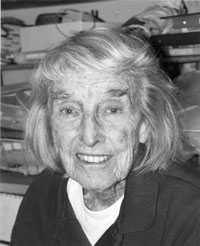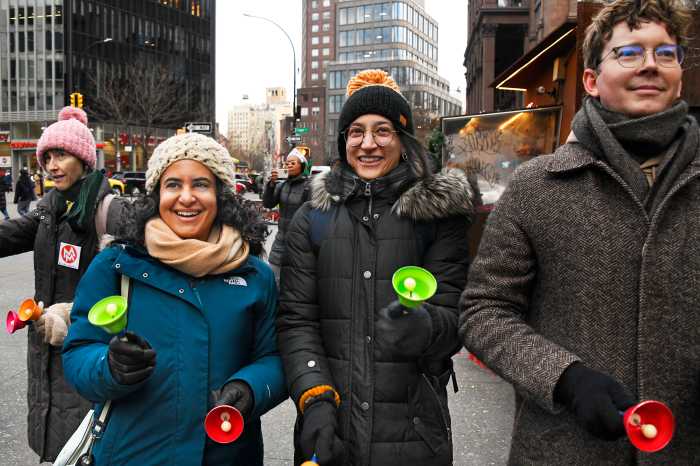By Albert Amateau
Jane Wood, the privileged daughter of a wealthy St. Louis family who came to New York and earned the admiration of tenants and housing advocates as a tenacious organizer and the founder of the Chelsea Coalition on Housing, died last week at the age of 96.
Released from the hospital in February, she died in her Chelsea apartment in the company of her daughter, Sara Dearry. Jane Wood had emphysema and had broken a rib in a fall earlier this year, said her stepson, Tim Wood.
She came to New York City soon after graduating from Smith College in 1929, “part of a circle of radicals and artists in the Village,” said her stepson.
At a tribute to her in 1999 at the Hudson Guild in Chelsea, she told The Villager, “My first job in New York was in an auto parts factory. I was fired for union organizing.”
Chelsea residents, housing advocates and elected officials last week recalled her role in fighting against tenant evictions over the past 50 years.
“She was one of the most amazing people I’ve ever met and she had a tremendous influence on me,” said State Senator Tom Duane who first met her in 1976. “There’s not a block in Chelsea where I couldn’t find a building where Jane and the coalition haven’t fought for tenants or stopped someone from being evicted,” he said.
“Of course she’d be very angry if she knew we were talking as if it was all about her,” Duane added. “She’d always say the Coalition on Housing was everybody in it, not just one person.”
Michael McKee, associate director of New York State Tenants & Neighbors Coalition who first met Jane Wood at the end of 1970, said, “She was an inspiration. Every time I feel like giving up I think of Jane. I saw her a few months ago walking down Eighth Ave. late at night with two canes, probably from a tenant meeting.”
In July of 2001 at the age of 93, Wood donned a frilly nightgown and cap and “went to bed” on a mattress in the lobby of the six-story W. 19th St. building where she lived, as part of a dramatized protest over the elevator, which had been out of service for five weeks. Tenant advocates at the protest took the opportunity to recognize Wood’s preeminence as a tenant organizer. “She’s my idol,” Bob Kalin, an organizer with Housing Conservation Coordinators in Hell’s Kitchen, said at the time. “She’s the patron saint of all tenant organizers.”
For seven years she was involved in the efforts to stop the eviction of long-term women residents from Leo House, a Catholic travelers’ hostel on W. 23rd St. “She walked up to a group of us in Housing Court in 1993 and told us what we had to do,” said Catherine Klemann, a former resident. “I moved out in 1998, one of the last to leave, but she gave us courage to carry on,” said Klemann.
City Councilmember Christine Quinn recalled being introduced to Jane Wood when she worked on Duane’s 1991 campaign for City Council. “He described her as one of the most important tenant advocates on the West Side. She was committed to housing and tenants’ rights,” said Quinn. “Even when it seemed hopeless, she was unwavering, never bitter, and encouraged everyone. She didn’t care if it was the archbishop or a slumlord, she was afraid of no one.”
Gloria Sukenick, a member of the coalition for many years, recalled Jane Wood’s mobilizing neighborhood protests against Barneys in 1985 when the clothing store expanded from its original building on Seventh Ave. into adjacent property on W. 17th, displacing longtime tenants. “We staged our own fashion show in the street,” said Sukenick. “Jane was difficult, stubborn and operated out of a belief that justice should be done and that she would have a hand in it,” Sukenick recalled.
Tim Gay, a former Democratic district leader and resident of W. 17th St., recalled meeting Wood in 1985 when he had a landlord-tenant problem. “People in my building told me not to talk to Jane Wood because they said she was a communist. But I went to her because she knew how to fight,” said Gay. “She was a good friend and fought for people with AIDS when they were being shunned by most people.”
Jane was born Janet Kauffman in St. Louis on June 3, 1907, the daughter of Harold Kauffman, president of Boatman’s Bank (later merged with Bank of America) in St. Louis, and Jeannette Morton Kauffman, a Mayflower descendent.
James Morrissey, Jane Wood’s attorney, recalled that she told him that as a teenager, she used to ride in foxhunts with August Busch, Sr. (patriarch of the Budweiser brewery), and that at her mother’s luncheons, St. Louis society women would converse in French. “Her ‘big sister’ at Smith was Anne Morrow who later married Charles Lindbergh,” Morrissey said. “Jane said that Lindbergh once flew to St. Louis just to meet her.”
“She said she often went to Paris. She met Ernest Hemingway there just after he married Pauline Pfeiffer, Jane’s friend from St. Louis,” Morrissey said.
Her cousin and tennis partner in St. Louis was William McChesney Martin, who became head of the Federal Reserve Bank, and another cousin was Dwight Davis, founder of the Davis Cup in tennis who served as U.S. Secretary of War in 1926.
In New York, Jane lived first in the Village and then moved to Chelsea. She worked at various jobs — the auto parts factory from which she was fired for union organizing, as a waitress and as a printer, the only woman member for a time of the International Typographers’ Union. She eventually owned and operated her own printing business.
In 1947 Jane married Bob Wood, a Community Party organizer who eventually left the party — “He had problems with the party and was defrocked,” said Tim Wood. Bob and Jane were early supporters of the Cuban revolution and Fidel Castro. They adopted Sara in Puerto Rico in 1957. Bob Wood became an importer of Cuban cigars before the U.S. embargo. He died in 1963 at the age of 56. Jane Wood made frequent trips to Cuba with the “Vinceremos Brigade,” cutting cane, the most recent was a few years ago.
“Jane wasn’t very theoretical,” said Tim Wood, an architect and teacher of architecture, who lives in Manhattan. “She saw people suffering during the Depression and went to work to do something about it.”
The Chelsea Coalition on Housing was an outgrowth of Jane Wood’s fight against the Penn South co-op, a union-sponsored development that replaced nine square blocks of tenements. The 10-building co-op was built, but residents in the tenements that were replaced were given priority at Penn South.
A memorial service for Wood will be held June 5 at the Fulton Senior Center, 119 Ninth Ave.
At the viewing at Redden’s Funeral Home on W. 14th St. on Sat. March 20, scores of friends, activists and neighbors reminisced and paid tribute to Jane Wood.
Bob Martin, a staff member of District Council 37 United Auto Workers said, “She was the mentor and educator of many tenant organizers and taught us all.” Martin and his wife, Kate Abell, a teacher, met Wood in 1976 when they moved to Chelsea and squatted in a building on W. 17th St. that was eventually taken over by the city for nonpayment of taxes.
Susan Cohen, a lawyer with Legal Services of New York City, said it was Jane Wood’s influence that made her go to law school. “I met her like everyone else because of problems with my landlord,” Cohen said. “I joined one of her demonstrations and the next thing I knew I was being arrested. It took some explaining on my law school application. But she empowered people and gave us all courage and confidence.”
Norma Aviles recalled the winter of 1986 when she was seven months pregnant and living at 457 W. 17th St. where a boiler broke down and the landlord refused to replace it. “I didn’t know what to do, but she told me, ‘You’re going to be the leader of this building. Don’t leave.’ We stayed and she got us a new boiler in two months by order of Judge Gerald Klein. Jane would make lawyers shake,” Aviles said.
“I don’t think I ever knew a more focused and tenacious fighter,” said Assemblymember Deborah Glick. “She was in the tradition of Jane Jacobs and Jane Benedict — I don’t know what it is about the name Jane,” Glick added, referring to Jacobs, a former Village activist and urban planning thinker, and Benedict, a leader of Met Council on Housing.
Congressmember Jerrold Nadler, whose district includes Chelsea, said in a statement, “The tenants movement has lost part of its soul with the passing of Jane Wood. She was an inspiration to us all, and we will carry on in the struggle for decent, affordable housing in her memory.”
Kernan Huttick, met Jane Wood in 1994 during a fight with his landlord on W. 22nd St. and became active in the Chelsea Coalition on Housing. “She was my mother, mentor, teacher and mostly my friend,” said Huttick. “Sometimes when we were making flyers and posters for a demonstration, she’d tell me, ‘Dig a little deeper and come up with something better.’ ”
Linda Riera, a coalition member, said, “Jane is gone but the coalition lives. We had a meeting and tenants clinic on 17th St. the day she died. She would have wanted it that way.”
In addition to her stepson, Tim Wood, and adopted daughter, Sara Dearry, of Coeburn, Va., eight grandchildren also survive. Burial was in Stillwater Cemetery in New Jersey where Bob Wood is buried. Donations may be made in her memory to the Chelsea Coalition on Housing, PO Box 1164, Old Chelsea Sta., New York, NY 10113.





































